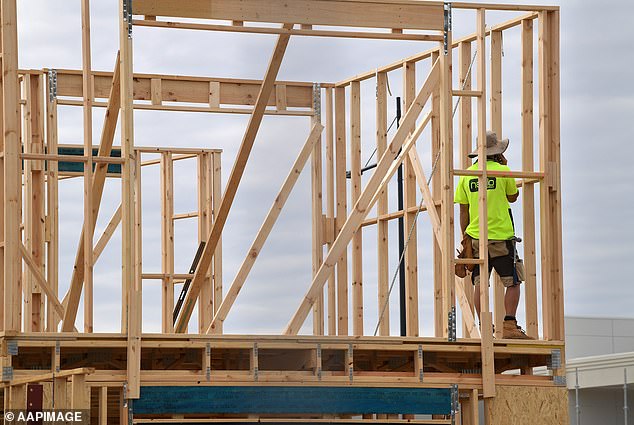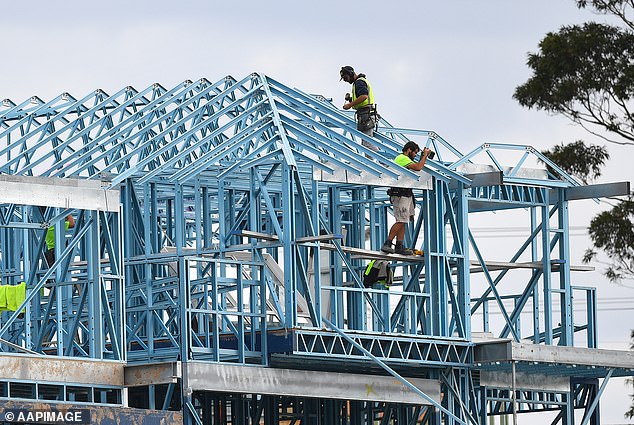An Australian mother and entrepreneur is looking to revolutionise Australia’s construction industry after seeing her husband’s subcontracting company collapse due to a common but dubious practice.
Louise Stewart and her husband were unable to prevent their Perth-based company from collapsing under the weight of personal debts that piled up after the global financial crisis, when several builders failed to pay their bills and became insolvent.
The industry had become saturated with builders taking advantage of the then Rudd government’s $14 billion primary school building program, which was intended to boost the economy.
Ms. Stewart said she saw builders try to pay off their debts by taking on new projects before spending money on other construction or even personal expenses.
The industry’s house of cards soon collapsed under the weight of mounting debts, leaving owners, subcontractors and suppliers out of pocket.
The mother-of-two saw the Morrison government on the cusp of making the same mistake with the Home Builders Scheme in 2020 and urged them to ban the practice or face another wave of insolvencies.
Their pleas fell on deaf ears and the once again bloated industry was hit with exorbitant costs and led to 2,975 insolvencies during the 2023/24 financial year.
With no government legislation in place, Ms Stewart took on the task of fixing payment processes in the industry to mitigate the risk of insolvencies.
Australian entrepreneur Louise Stewart (pictured) is looking to improve financial security for the construction industry with her third-party payment platform, ProjectPay
Ms Stewart had worked for international technology companies and made millions from the sale of her business, Revive Group, before her husband’s company collapsed.
Despite the success of her own business and the fact that her husband had owned it for more than two decades, they concluded that their debts made it unsalvageable.
“When you have so many construction companies going bust and not getting paid, it’s literally impossible to run a business in that kind of environment,” he told Daily Mail Australia.
‘This problem of builders going bankrupt and subcontractors not getting paid and whoever owns the project just losing money is a very big problem that has existed in Australia for a long time.’
She said her husband “was not the same” after his company went into liquidation and he spent the next few years struggling to repay loans taken out to keep it afloat.
The problem has similarly affected many other small business owners whose lives have been ruined by mountains of debt.
‘(Subcontractors) are forced into this debt trap by taking out expensive credit cards or loans where the family home is offered as collateral in order to have the working capital to deliver the projects,’ Ms Stewart said.
“They expect to be paid later, but too often they get paid 120 days later or not at all.”
He added that he was seeing the same trends that affected his family emerging again and looked for a way to make payments more secure.

Mrs Stewart’s husband’s subcontracting company collapsed as many builders went bankrupt

The mother criticised the Australian government for failing to implement laws that do not protect clients’ or subcontractors’ money from insolvency or misuse (file image)
Ms Stewart launched ProjectPay in 2019, which allows subcontractors and builders to receive incremental payments for the work they have done on a project.
The “buy now, pay later” style company takes responsibility for confirming that the costs correspond to the project works and paying the invoices, allowing the client to pay once the construction is completed.
This means that clients will not suffer losses if the builder becomes insolvent, while subcontractors will get more frequent payments.
“What we have built is a technological platform that eliminates any risk of losing money due to a collapse or misuse of the platform,” he said.
However, Ms Stewart left for London in 2020 after seeing more interest in the company from the UK government than from Australia.
She was then included in the UK’s Global Entrepreneurship Programme and received funding to help her expand in the country.
After winning innovation awards and the country’s top small business payouts in 2022 and appearing on the UK’s Women in Fintech Powerlist, Ms Stewart is looking to bring the company back to Australia.
She said she was disappointed that the government had not implemented laws similar to those in the United States that protected subcontractors and clients.

Its platform aims to reduce the financial risk faced by clients and subcontractors and ensures that their money is only spent on the project they requested (stock image)
The country’s trust statutes protect any money paid to a company if it becomes insolvent and make it illegal to spend that money on anything other than the agreed project.
Ms Stewart said the company had since seen strong interest from banks, subcontractors and clients in Australia seeking security against insolvency.
“Even if your bank delays releasing your loan payment, we will continue to pay your invoices and your subcontractors so that your project can continue,” he said.
“And now what we’re finding is that very large banks in Australia are approaching us and saying, ‘We want to work with you because we want to do an end-to-end payment process.'”
One Sydney-based project manager said he would be “interested” to see how ProjectPay works in practice, but raised concerns about the benefits to builders.
“Every builder already has their own system in place and it would be difficult for a client to come to me and say ‘I want you to use this one’,” he told Daily Mail Australia.
“Learning this new system and uploading invoices into it and so on seems like a lot of work.”
He noted that safety in the industry has become increasingly important, but said there is a need to attract builders.


